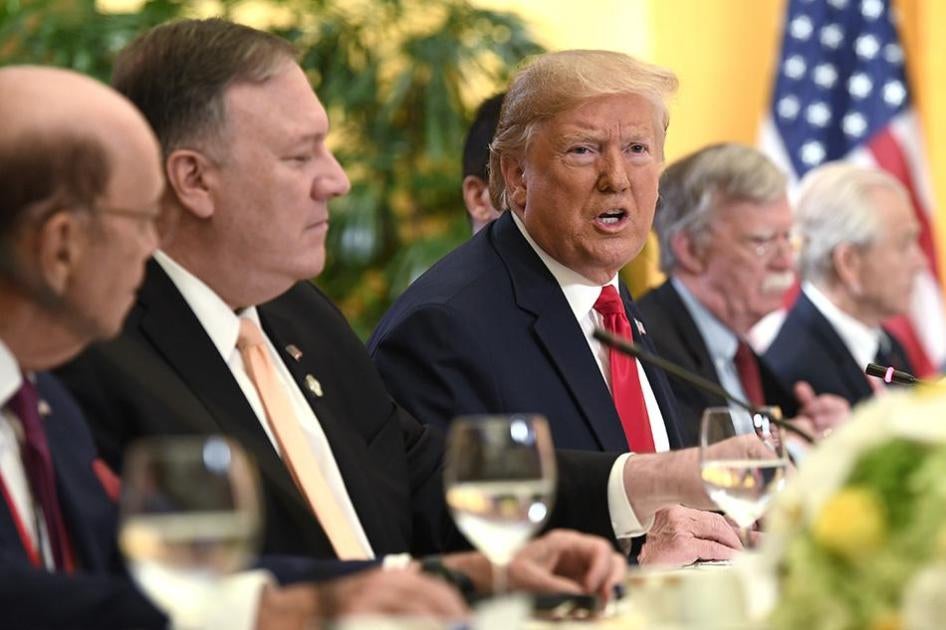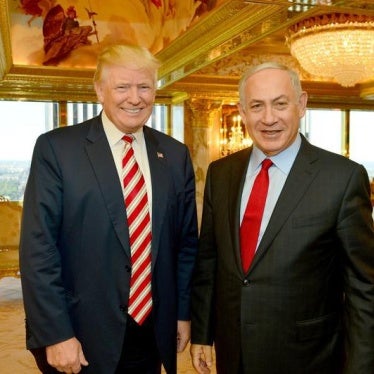Secretary of State Mike Pompeo announced on Monday the creation of a Commission on Unalienable Rights to provide “an informed review of the role of human rights in American foreign policy.” But this superficially laudable step is fraught with threats to the very human rights that it purports to strengthen.
That is because, as Pompeo suggested, the purpose of the commission is not to uphold all rights but to pick and choose among them: “What does it mean to say or claim that something is, in fact, a human right? How do we know or how do we determine whether that claim that this or that is a human right, is it true, and therefore, ought it to be honored?”
But human rights do not exist in the eye of the beholder. International treaties that have been widely ratified (though many not by the United States) codify what they term “inalienable” human rights.
The fundamental rights set out in these treaties are clear, but the Trump administration is unhappy that they are cited to uphold, for example, reproductive freedom or the rights of LGBT people not to face discrimination. So there is reason to fear that this exercise in identifying “unalienable” rights is a unilateral attempt to rewrite international law according to the administration’s conservative social views.
Those fears are only intensified by Pompeo’s selection of Mary Ann Glendon, a prominent scholar opposed to abortion and same-sex marriage, to head the commission. Pompeo himself, in a Wall Street Journal op-ed, complained that “rights claims are often aimed more at rewarding interest groups and dividing humanity into subgroups,” apparently taking issue with rights that protect women and LGBT people.
Pompeo justified the need for “fresh thinking” by citing an alleged conflict among rights: “As human rights claims have proliferated, some claims have come into tension with one another, provoking questions and clashes about which rights are entitled to gain respect.” He didn’t explain further, but it’s likely he is referring to the Trump administration’s view, asserted domestically in the courts, that reproductive and LGBT rights conflict with religious freedom such that one’s religious views should take precedence over, for instance, the duty not to discriminate.
These comments about a “clash” of rights might also be used to reaffirm the long-standing U.S. position that only civil and political rights, not economic and social rights, are real human rights. Both are detailed in widely ratified treaties — the two “covenants” that list the rights originally set out in the Universal Declaration of Human Rights. But while China, for example, has never ratified the civil and political rights treaty — the sorts of rights detailed in the U.S. Constitution — the United States has never ratified the one on economic, social and cultural rights, which lists such rights as to food, health care and housing.
China takes the view (as did the Soviet Union) that economic development should precede concerns about respecting civil and political rights. Rather than embracing a “clash” of rights perspective that makes possible such false dichotomies, the administration theoretically could reaffirm the covenants’ treatment of them as equal. It could note that the best way to ensure that economic development reflects popular needs rather than a government’s preferences for corruption, power preservation or self-aggrandizement is to recognize both sets of rights — economic and social — to highlight governmental duties in this area, and civil and political rights, so governmental conduct is scrutinized. But not since Franklin Delano Roosevelt has the U.S. government recognized the validity of economic and social rights, and no one expects the Trump administration to change that.
Beyond an apparent effort to rethink the nature of human rights, the commission will advise on the promotion of human rights in U.S. foreign policy. But we don’t need a commission to figure out that the Trump administration will have little credibility promoting human rights so long as the president continues to embrace autocrats — Vladimir Putin, Abdel Fatah al-Sissi, Mohammed bin Salman and the like — while expressing envy of their ability to silence or compromise the checks and balances on their authority, such as the independent judges, probing journalists and pesky activists who are essential to democracy. And that’s not even mentioning his trampling on rights at home, such as the separation of immigrant children from their families and their detention in horrible conditions.
The real aim in this regard may be revealed by Pompeo’s claim that “international institutions remain confused about their respective responsibilities concerning human rights.” Again, it’s hard to know what this means, but given the Trump administration’s withdrawal from the U.N. Human Rights Council for supposedly criticizing Israel too much, the asserted confusion sounds more like a failure to fall lockstep into the Trump administration’s very selective idea of what the enforcement of universal human rights means.
Interestingly, the council has remained strong in many areas even without the Trump administration. For the first time, it condemned Venezuela, in large part because the effort was led by Latin American democracies rather than what could have been passed off as an American imperialist endeavor. Iceland, which assumed the U.S. seat, has just led a successful effort to condemn the mass summary executions spawned by the “drug war” of Philippine President Rodrigo Duterte, one of the autocrats whom Trump has embraced. The reality is, any confusion about human rights rests not so much with international institutions as in the Trump administration’s commitment to defend them.










